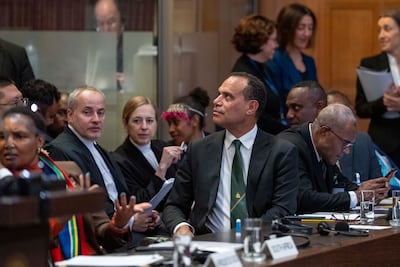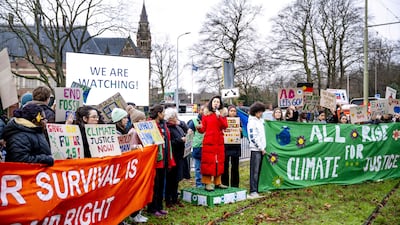Pacific islanders threatened by rising sea levels took the world's top polluters to the UN's highest court on Monday to seek reparations for the effects of climate change.
In a ground-breaking case, the International Court of Justice will consider whether polluters responsible for global warming are bound by essential legal customs such as self-determination and human rights to compensate for the damage to the planet.
Vanuatu opened the proceedings in The Hague on Monday, telling the 15-judge bench led by Lebanon's Nawaf Salam that the outcome of the case "will reverberate across generations". Dozens of countries including Middle East states will take the floor during two weeks of hearings.
"This may well be the most consequential case in the history of humanity," said Ralph Regenvanu, a special envoy for Vanuatu. He said the conduct of a handful of top polluters was "unlawful under a range of international obligations".
The case opened just over a week after the Cop29 summit in Azerbaijan ended with many developing countries disappointed by a $300 billion pledge to fight climate change. The amount agreed was smaller than hard-hit nations had asked for, and the terms less specific about who should pay.
Mr Regenvanu said the talks in Baku showed a "failure of the process" as climate-conscious countries turn to international law as an alternative. "There is an urgent need for a collective response to climate change grounded not in political convenience but in international law," he told the court.
Margaretha Wewerinke-Singh, a law professor representing Vanuatu, told the court that states responsible for climate change "are required to make full reparation for the injury they have caused". She said reparations should be proportionate to historic contributions to global warming.
Judges should also insist on countries "stopping actions that fuel the fire", such as expanding fossil fuel use, she told the bench.

The United States, the world's biggest historical polluter ahead of China and Russia, opposes a case it says could "accentuate disagreements" and "complicate our collective efforts". Britain supported it on the basis that the court will not decide whether specific countries are in breach of the law.
Environmental activists hope a ruling in their favour, although non-binding, will ripple across the world and spur domestic courts to insist on more ambitious climate policies from their governments. Campaigners gathered outside the Peace Palace under the slogan: "We are watching."
In the courtroom, lawyers invoked the principles of due diligence, self-determination, preventing significant harm, protecting human rights and the law of the sea, as they seek a ruling from the ICJ that these oblige states not to contribute to global warming. The issue was referred to the court by resolution of the UN General Assembly last year.
Julian Anguan, a lawyer from Guam representing a group of Pacific states called the Melanesian Spearhead Group, said climate change had "already caused grievous violations of the right to self-determination", such as loss of natural resources and forced displacement from traditional homelands.
"The peoples of Melanesia live exceptionally close to the Earth and thus feel the vandalism visited upon it acutely," he said. "They have lost nearly everything that has since time immemorial formed their very essence as peoples."


